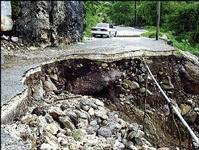
Heavy rains associated with Hurricane Wilma damaged the country's transportation network. - Ian Allen/Staff Photographer
THIS YEAR was a true test for the Jamaican economy. An air of optimism started off the new year as the country found itself in unaccustomed circumstances. Interest rates were at a 10 year low, the dollar was stable and it was even held that the fiscal deficit could disappear. Many speculated that 2005 could be the turning point in Jamaica's fortunes and the beginning of meaningful economic growth for the second half of the decade. However, the nagging question about our vulnerability to external shocks and the overarching menace of crime remained.
That question was thoroughly answered in 2005 with the following challenges:
Drought in June
Adverse weather conditions a record-setting hurricane season, in which Jamaica was affected by two hurricanes, 'Dennis' and 'Emily'.
Torrential rains in October which damaged our roads
Record oil prices
Crime (Almost 1,600 murders so far compared to the 1,471 for all of 2004)
The year 2005 was truly a year of unenviable records and the analysis below highlights the economy's response to these shocks as well as its behaviour when compared to 2004. Let's look at the highlights of the year.
1) ECONOMIC GROWTH AND GDP
For the first nine months of 2005, real GDP growth was estimated at 1.4 per cent. The Services sector was estimated to have grown by 1.0 per cent and Goods production increased by 0.7 per cent. The main sources of growth were mining and quarrying (up 5.1 per cent) and construc-tion and installation (up 9.1 per cent).
It may come as a surprise to many people that the economy actually grew. However, if we stop and think about it we are comparing this year's growth against 2004, a year that was severely affected by Hurricane Ivan. Growth in 2005 could be assumed due to the gradual normalisation of some sectors after Hurricane Ivan. This also helps to explain why the construction and installation sector grew by over nine per cent.
The tragedy is that were it not for hurricanes Dennis and Emily which detracted from our growth performance Jamaica seemed eligible to experience growth above three per cent, something it has not been able to do for over 10 years.
2) INFLATION
Our food supply, dependence on oil and consumption of imported goods has resulted in Jamaica's inflation being very vulnerable to shocks. When the dollar devalues or international oil prices rise we pay more for imports and energy. When our food supply is shortened by adverse weather we pay more to eat, situations we have no defence against, at least for now. Inflation for January to November 2005 stands at 12.8 per cent and, barring a Christmas miracle in December, this will be Jamaica's third consecutive year of double digit inflation.
Although inflation is slowing the real issue is that Jamaica may only be able to experience single digit inflation barring external shocks. The country's response to shortages has been the importation of certain items for a short time, which helped to lead to the situation in the current account described below.
3) CURRENT ACCOUNT
The current account deficit for the period April to August 2005 expanded by US$135.2 million to US$343.7 million, relative to the corresponding period of 2004. This deterioration reflected respective increases of US$213.9 million and US$16.8 million in the deficits on the goods and income accounts, which were partly offset by expansions of US$78.9 million and US$16.6 million in net receipts from current transfers and services, respectively.
WHAT DOES THIS ALL MEAN?
It means that the Jamaican economy is battered and bruised but still standing. By looking at the table, we see that Jamaica has gone through not one, but two tough hurricane seasons and not folded. In fact it has behaved quite similarly in the two periods.
All the signs are there to suggest that if we are affected by external shocks in 2006 the economy will react as it did in 2005.We must begin to say more than the stereotypical line which goes something like this "The outlook for the economy looks encouraging with inflation slowing down and a promising tourism season due to Cancun's demise. Barring no external shocks Jamaica should do well".
At this juncture it is important that we recognise the tenacity of our economy and the true grit it has to withstand shocks in order to not have a repeat of 2003 where interest rose to the thirties.
This is the key for individual investors trying to plot a course to financial security. The years 2004 and 2005,have been difficult periods, and the uncertainty will not disappear overnight, however, investors can do better than simply get by.
They can create wealth by getting advice and investing in the right securities, especially hard currency mutual funds, remember asset diversification is important.
Ask yourself this question, will I be wealthier in 2006 whether or not Jamaica experiences external shocks.
Submitted by the Distribution & Wealth Management Unit of NCB Capital Markets Limited,, contact them at
1-888-4WEALTH or info@ncbcapitalmarkets.com NCB Capital Markets Limited ('NCBCML') through its representative(s), has provided information to you on various financial products and services and investment opportunities for information and educational purposes only. While NCBCML has made every effort to ensure that the information provided to you is accurate and based on research and analysis that we have carried out or derived from sources that we believe to be accurate and reliable, NCBCML makes no representations or warranties about the accuracy, completeness or suitability for any purpose of the information published and will not be liable for any loss which you or anyone else may suffer in reliance on the information we have provided to you.














